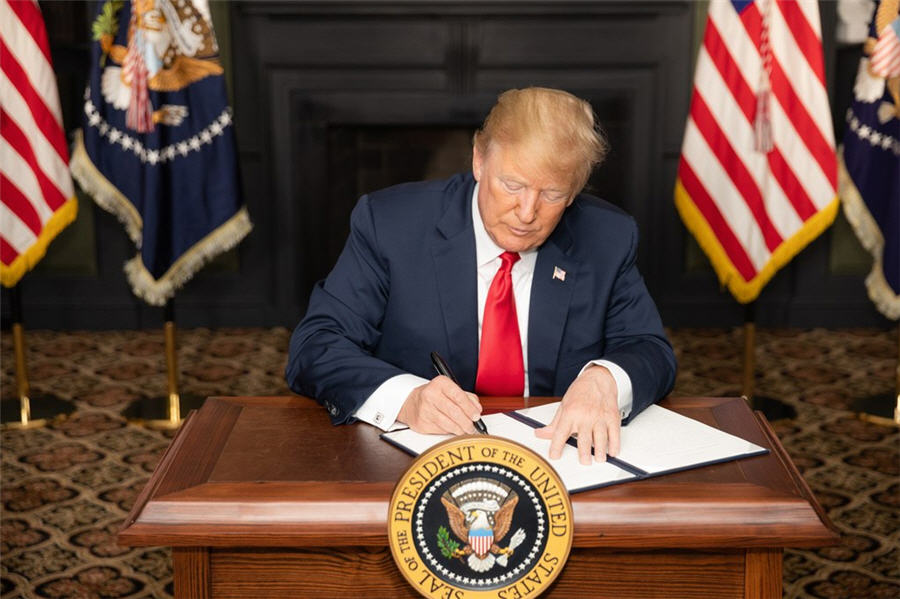Trump, citing US farmers, slaps metal tariffs on Brazil, Argentina

U.S. President Donald Trump ambushed Brazil and Argentina on Monday, announcing he would restore tariffs on U.S. steel and aluminum imports from the two countries in apparent retaliation for currency weakness he said was hurting U.S. farmers.
“Effective immediately, I will restore the Tariffs on all Steel & Aluminum that is shipped into the U.S. from those countries,” Trump wrote in an early morning tweet that sent officials from both countries scrambling for explanations from Washington. He added that Brazil and Argentina were “presiding over a massive devaluation of their currencies.”
In fact, the opposite is true: Both countries have actively been trying to strengthen their respective currencies against the dollar. The real and the peso have been buffeted by weakness partially linked to Trump’s trade battle with China.
In Brazil, the recent slide in the real has caused a public outcry and led the central bank to intervene, while Argentina put in place currency controls to steady its beleaguered peso
U.S. farmers, who have been hit by the U.S.-China trade war, represent a key demographic for Trump ahead of the November 2020 election. They have watched in vain as the trade war has hurt the competitiveness of U.S. agricultural products, allowing their Brazilian and Argentine peers to get rich off China.
“For many Brazilians, this smells like revenge for their country’s soybean farmers bonanza – they have benefited enormously from the U.S.-China trade war by replacing U.S. soybeans sales into China,” said Kim Catechis, head of investment strategy at Martin Currie.
Representatives for the U.S. State Department and the Office of the U.S. Trade Representative did not immediately respond to a request for comment.
Brazil’s president, Jair Bolsonaro, an avowed Trump fan who has sought closer U.S. ties, said in a local radio interview that he would call his U.S. counterpart, who he was confident would listen to Brazil’s concerns.
“I don’t see this as retaliation,” Bolsonaro told Radio Itatiaia. “I’m going to call him so that he doesn’t penalize us … Our economy basically comes from commodities, it’s what we’ve got. I hope that he understands … and I’m almost certain he’ll listen to us.”
In a statement, Brazil’s government said it was already in discussions with Washington. A source familiar with Brasilia’s reaction rejected the U.S. claim of currency manipulation, noting the central bank was working to lift the real.
Argentine Production Minister Dante Sica said Trump’s announcement was “unexpected” and he was seeking talks with U.S. officials. Additionally, Argentina’s Foreign Ministry said it will begin negotiations with the U.S. State Department.
“We are trying to get more precision (about the announcement) and what impact it could have” both commercially and administratively, Sica said. “We do not yet know the magnitude (of the measure).”
Argentina’s production ministry said in a statement the country has exported around $520 million in steel and aluminum to the United States so far this year after exporting $700 million in 2018.
Currency questions
Trump’s accusation that the Brazilian and Argentine currencies were being artificially devalued was met with widespread skepticism.
In Brazil, the recent slide in the real has caused a public outcry and led the central bank to intervene, while Argentina put in place currency controls to steady its beleaguered peso.
Trump also urged the Federal Reserve to lower interest rates so countries “no longer take advantage of our strong dollar. Lower Rates & Loosen – Fed!”
“For many Brazilians, this smells like revenge for their country’s soybean farmers bonanza – they have benefited enormously from the US-China trade war by replacing US soybeans sales into China”
Trump has repeatedly urged the U.S. central bank to lower rates to below zero, but Fed policymakers have been reluctant. Fed policy makers hold their next meeting on Dec. 10-11.
The Instituto Aco Brasil, the country’s main steel lobby, said it was “perplexed” by Trump’s decision. It said in a statement that Brazil’s government could not be meddling with the real as the currency is free-floating.
“The decision to tax Brazilian steel as a way of ‘compensating’ the American farmer is a retaliation against Brazil,” it said. “Such a decision ends up hurting the American steelmaking industry itself, which needs semi-finished products exported by Brazil in order to operate its mills.”
Shares of U.S. steelmakers rose on Monday, with United States Steel Corp up 4.0% at $13.65 in afternoon trading and AK Steel Holding rising 5.8% to $2.92.
Brazilian steelmakers’ shares fell initially but then rebounded. Analysts from JP Morgan suggested buying the sector on any weakness, saying any tariff hike “should not be material” given their relatively small U.S. export volumes.
Shares of Ternium Argentina slumped 5.5% after Trump’s tweet, with JP Morgan noting it is the most exposed steelmaker in Latin America to the tariff move. The shares pared some losses to trade down 2.9% in afternoon.
(By Gabriel Stargardter, Andrea Shalal, Susan Heavey, Cassandra Garrison, Maximilian Heath, Lisandra Paraguassu, Pedro Fonseca and Herb Lash; Editing by David Gregorio and Matthew Lewis)
{{ commodity.name }}
{{ post.title }}
{{ post.date }}




Comments